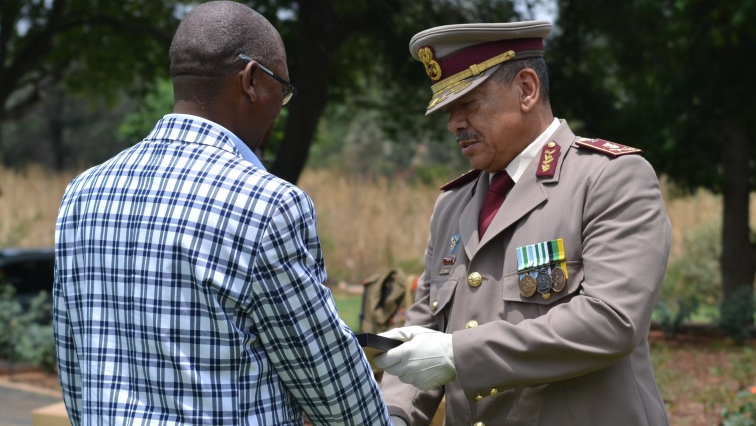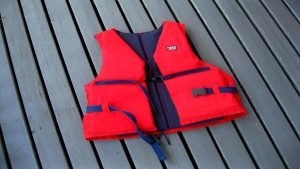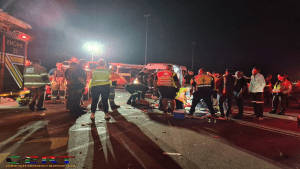The sacrifice and suffering of millions of soldiers have been remembered, with special emphasis on those who died in World War I, at the annual memorial service in Pretoria.
Speaking at the first Remembrance Day service to be held at the Thaba Tshwane New Military Cemetery, the Chairperson of the Memorial Services Council Marina Valentine, said the 101st anniversary service was to honour those who have served and made the ultimate sacrifice.
The service began with the lighting of a candle in tribute to the unknown soldier – who was represented by a helmet and a uniform jacket placed on an empty chair.
At least 17-million soldiers died in WW1 – in many cases a proper burial was not possible; the inability to identify the remains meant that hundreds of thousands of names could not be linked to a body or a grave. The unknown soldier tradition ensures that every fallen soldier is remembered.
One of the organisers, Charles Ross of the South African Legion of Military Veterans, explained the decision to move the event from the usual venue at the Union Buildings.
“The challenge that we started running into at the Union Buildings is it’s not wheelchair friendly and space is a problem. Pretoria doesn’t have a cenotaph like most other cities. The reason to move it to this cemetery is it is a cemetery where people are buried that served and paid the highest sacrifice. These are all Second World War graves – people can feel the whole atmosphere of people who are lying on either side of them where they are sitting, that have paid the highest price.”
The British established Thaba Tshwane as a military garrison town after the South African war (Anglo Boer War) of 1899 to 1902. It was taken over by the South African Department of Defence after union in 1910.
During the first and second world wars, military hospitals and a convalescent camp operated here.
In this cemetery, which is maintained by the South African branch of the Commonwealth War Graves Commission, there are 293 Commonwealth graves; 272 South Africans, 21 British, one Greek, one Belgian and one non-war grave.
Tribute was also paid to another veteran, Private Stephen Gape, who served for two years during the Second World War and died in 1942. His grandson, Sylvestor Gape, finally received the two medals his grandfather had earned for serving in the Union Defence Force.
Research indicated Gape did his basics in Potchefstroom and was then deployed to Piet Retief where he was probably trained as a stretcher bearer.
An emotional and proud Sylvestor Gape said: “I was just here to honour his name, his legacy, but receiving his medal, I even had a teary eye. I thought it would be on one occasion, this was definitely a surprise. We didn’t even have the chance to see the old man. The only thing that we hear is stories of him. I am trying to collect all his legacy so that I can honour him. Today I found out that he was a medic. This is the beginning of trying to know my grandfather.”
Ross, who helped to research Gape’s service record, said these are not his original medals. “These are medals we managed to get for him. The two were awarded to all South Africans who served within the borders of the country.”
Ross said the information is fairly easily available at the Department of Defence Archives. The file incudes information such as the day he joined, where he served, medical records, if he was ever wounded and medals.
Gape laid a wreath in tribute to his grandfather. Among others, wreaths were also laid on behalf of the Chiefs of the Army, Navy, Air Force, Military Health Services and the City of Tshwane as well as various veterans’ organisations such as the St Dunstan’s Association for South African War Blinded Veterans. Diplomatic representatives of the United Kingdom, France, Cyprus, the US, Japan and Ethiopia were also present to pay tribute.
The animals that died in various wars were also not forgotten. An Alsatian and his handler from the South African Police Counter Insurgency or COIN Veterans League laid a wreath to an emotional round of applause. Sixteen million animals participated in World War I. The Royal Society for the Prevention of Cruelty to Animals estimates that over 484-thousand mules, horses, camels and bullocks were killed in British service alone between 1914 and 1918.
Services have also been held in Johannesburg, Durban and Cape Town and at various schools across the country such as Jeppe High for Boys in Johannesburg and Glenwood High School in Durban.






